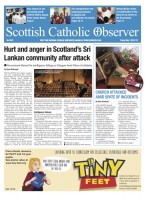April 12 | ![]() 0 COMMENTS
0 COMMENTS ![]() print
print

Outrage culture is too quick to condemn and denounce
Amid the ever-changing winds of an unmoored society, the Church offers concrete moral direction, by Fr Michael Kane
This weekend marks the beginning of Holy Week with the celebration of Palm Sunday.
It also signals the start of a very busy period around our parish. The statues have already been covered with purple cloth, the altars have been prepared, and the final preparations are being made for the solemn Triduum liturgies.
Aside from the practical considerations there is a stark key change in tone of the liturgy.
The reserved mood of Lent is briefly broken by the joy of Palm Sunday, only to be replaced by the shadow of the Cross, and the emerging glory of the empty tomb.
The liturgies are sensory and dramatic, and full of extremes.
A high point
One of the most striking elements of Holy Week is the change of tone in such a short space of time.
Palm Sunday is a high point in the Lord’s public ministry.
The people are astonished at His powerful preaching and the gracious words that come from His mouth. They are overwhelmed by His miracles and healings and want to forcibly make Him their King.
The chants of ‘Hosanna’ ring out as a great sign of his favour among men. He is very much the man of the moment.
How quickly things can change. How effortlessly the cries of ‘Hosanna’ are replaced by the death sentence of ‘Crucify Him!’
How quickly the people turn on Jesus when His Gospel begins to challenge them.
More than once I have wondered how it was that Jesus’ fate changed so suddenly.
Evident today
Why would the crowds turn against Him at a whim? Does it highlight a deep flaw in our human nature which is hungry to condemn?
It seems to me that 2,000 years later that flaw is as evident as ever. Human nature remains as fickle and changeable as in the Lord’s time.
Take for example the Western approach to Christian values. Core beliefs that were once cherished and celebrated can all of a sudden lose their appeal and be labelled as out of date, or even dangerous.
The Gospel and the Church are subject to the changeable face of society and the consequences of a fickle human nature.
Where once our Christian values were met with approval and respect, just like Jesus in the Gospel, those same values dare not be mentioned in some quarters today.
Bedrock of society
Take for example the constant and unwavering esteem we have for traditional marriage and natural family life, as the bedrock of society.
This and many other core beliefs concerning life and human dignity are now treated in some quarters with utter contempt, as detestable relics from another generation.
When we look at contemporary culture we tend to thrive on extremes. We intensely like or intensely hate, and the pendulum never stops.
Things that are relevant and warmly received today might be relegated to the dustbins of history tomorrow.
Today’s heroes, tomorrow’s villains
Even in our own personal relationships it only takes a word or a heated exchange and we swing with great gusto in the opposite direction.
Human life is full of these sorts of swings. Today’s hero football manager might be tomorrow’s villain. Today’s saviour politicians are condemned as tomorrow’s traitors.
One wrong step and the cries of the crowd emerge once again to condemn and denounce.
The pendulum of change keeps on swinging. People move further apart, to the extent that isolationism, borne out of extremes, becomes the order of the day.
How do we counteract this tendency within us? How do we avoid living on the extremes? It seems to me that culture must change.
Culture of criticism
Only last week Jesus warned against a culture of condemnation in the Gospel of the adulterous women.
Only when we recognise the dignity of other people can we temper our tendency to denounce.
Only when we understand that sin and error does not take away that dignity will we begin to see others with new eyes.
In this Holy Week of intense extremes: of light and darkness, Faith and doubt, death and resurrection, may we try to live our lives guided by the unchanging and glorious wisdom of Jesus.










